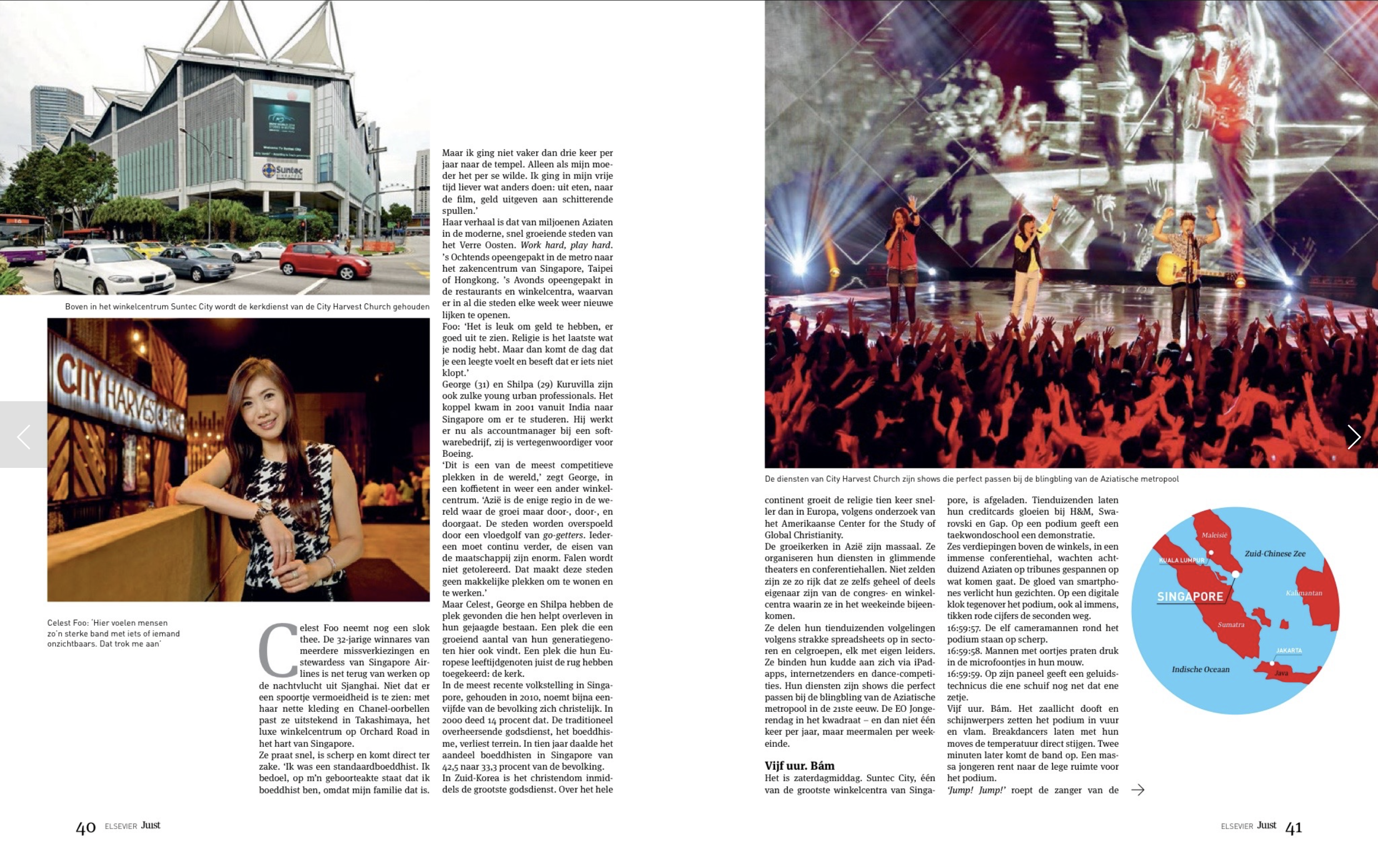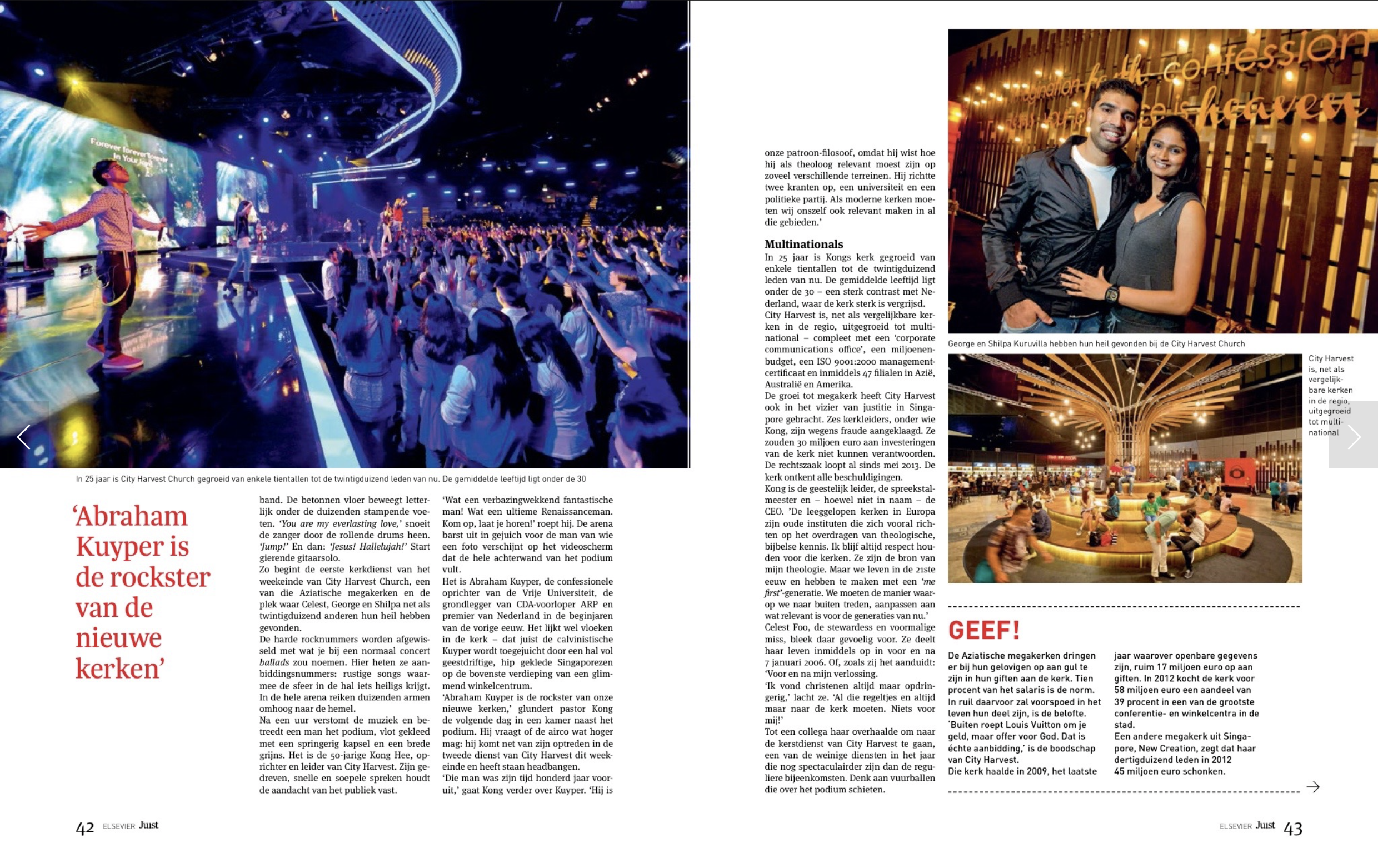
MOVE OVER BUDDHA,
HERE COMES JESUS!
Megachurches in Asia go out of their way to attract new, young believers. And they’re succeeding. Christianity is growing fast.
Text and Photos: Remko Tanis
Celest Foo takes another sip of her tea. The 32-year-old winner of multiple Miss-pageants and flight attendant for Singapore Airlines has just returned from working the night flight out of Shanghai, China. Not that she is showing any fatigue: wearing a very smart outfit, including Chanel earrings, she blends in perfectly with the other shoppers at the fancy Takashimaya department store on Orchard Road in Singapore.
She speaks quickly, is very alert and fast to get to the point: “I was a standard Buddhist. I mean: my birth certificate says I’m a Buddhist, because I come from a Buddhist family. But I never went to temple more than three times a year, only when my mom demanded it. I preferred doing other stuff in my free time, like going out for dinner, the movies, spending money on beautiful stuff.”
Foo’s story is that of millions of Asians living in the modern, fast growing metropolises of East Asia. Work Hard, Play Hard. That means spending the morning rush hour in packed subways in Singapore, Hong Kong or Taipei and spending time after work in packed shopping malls and restaurants, the number of which seems to increase by the week in each of these cities.
Foo: “It’s nice to have money, to look good. Religion is the last thing you need, you think. But the day always comes when you feel that void and realize something is wrong.”

Like Foo, George (31) and Shilpa (29) Kuruvilla are also young urban professionals in Singapore. They moved here from India in 2001 to go to university. George now works at a software company, Shilpa is a representative for Boeing.
“East Asia is one of the most competitive regions in the world,” says George, sitting in a coffee place in yet another shopping mall. “It’s the only region where economic growth just seems to keep going and going. The cities are being flooded with go-getters and everyone is expected to just keep going and going. Society’s demands are always looming. Failure is not an option. All of this makes the Asian cities tough places to work and live.”
But: Celest, George, and Shilpa claim to have found the place that helps them survive their rushed lives. A place where a growing number of their generation turns to as well. A place that is rapidly losing interest among their European counterparts: church.
During the most recent census in Singapore twenty percent of the population of little over five million registered themselves as christian. Ten years earlier, only fourteen percent did.
Meanwhile Buddhism, the traditionally leading religion in the city-state, is losing terrain. In ten years, the number of Singaporeans considering themselves Buddhist declined from 42.5 to 33.3 percent of the population.
In South Korea, christianity has become the leading religion. Compared to Europe, christianity is growing ten times faster in Asia according to the American Center for the Study of Global Christianity.
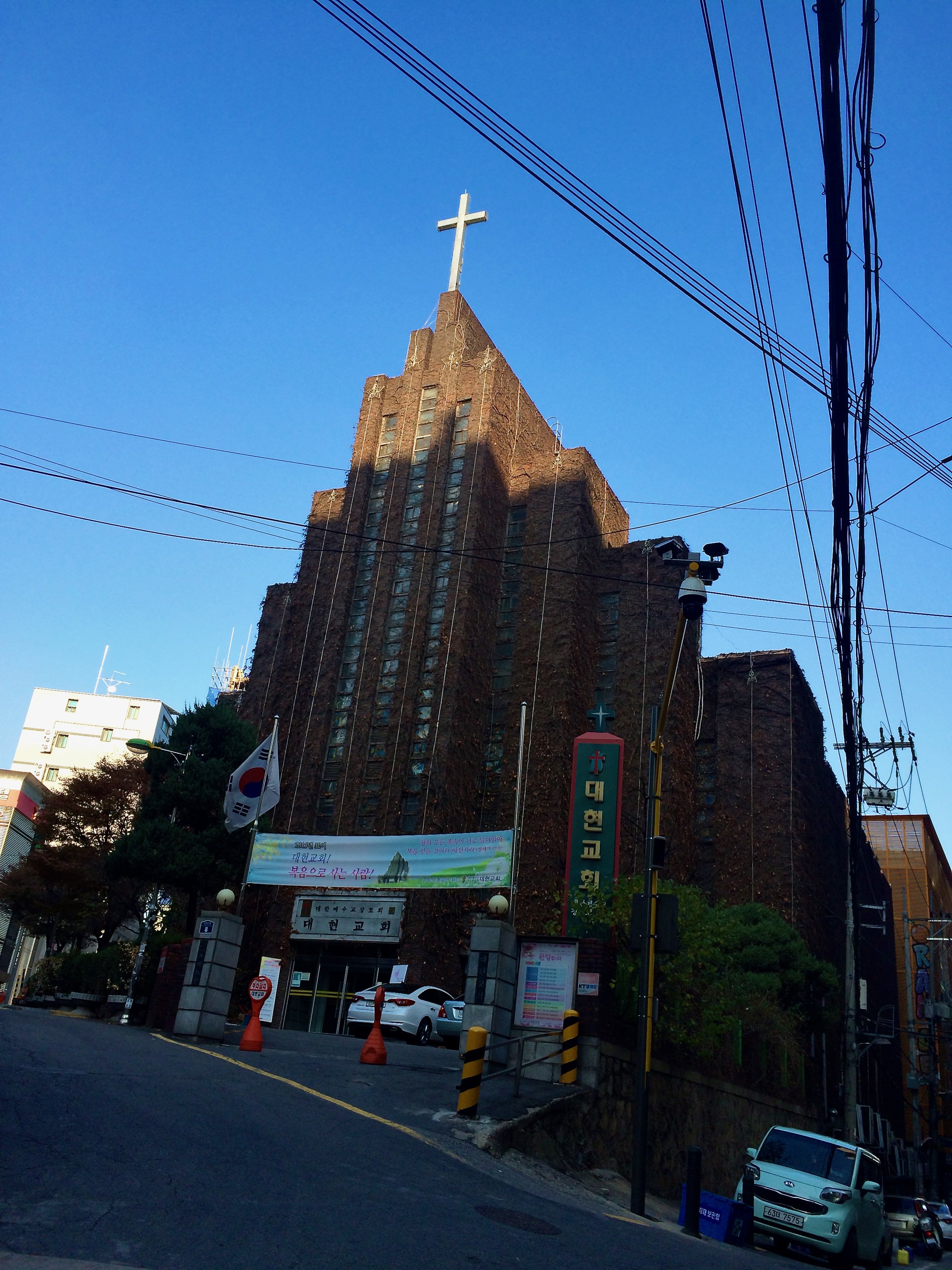
The christian churches in Asia, outside of mainland China, are generally speaking massive. They hold services in shiny theaters and conference centers. Not rarely have they become so wealthy, that they own a part or everything of the centers and shopping malls where they gather during the weekend.
Each church easily has a member count that runs in the tens of thousands, organized in rigid spreadsheets along ‘sectors’ and ‘cells’ that each have their own leader. They tie their herd close to the chest using mobile apps, streaming, and, of course: break-dance competitions. Their Sunday services have all the bling you expect from an Asian metropolis in the 21st century.
It’s Saturday afternoon in Suntec City, one of Singapore’s largest shopping centers. Tens of thousands of shoppers set their credit cards on fire at H&M, Swarovski and Gap. On the stage in one of the central halls, a taekwondo school is doing a demo.
Six floors up, in a gigantic conference hall, eight thousand people fill the bleachers. You can feel the tension, the excitement, the anticipation. The glow of smartphones lights their faces. Red digits on a clock on the opposite side of the stage count away the seconds.
16:59:57. Eleven cameramen on stage are on high alert.
16:59:58. Men with earpieces are busy talking into mics in their sleeves.
16:59:59. A sound technician adjusts one of the slides on the board ever so slightly.
Five o’clock. Bam. Room lights out, spot light on. The stage erupts with action. Break-dancers instantly raise the temperature in the room. Another two minutes and a band comes on stage. Teenagers rush from the bleachers to the area in front of the stage.
The singer of the band shouts at them: “Jump! Jump!” You can feel the concrete floor moving under the weight of the thousands who oblige. The singer rolls over the beating drums: “You are my everlasting love. Jump! Jesus! Hallelujah!” Enter screaming guitar solo.
And with that, the first service of the weekend is on its way at City Harvest Church, one of Asia’s megachurches and the one where Celest, George and Shilpa have found their place, just like twenty thousand other Singaporeans.

The raving rock songs make room for what you’d call ballads at a regular concert. At City Harvest Church, they call them songs of worship: slower melodies aimed to increase the feeling of spirituality. Thousands raise their arms to heaven throughout the arena.
After one hour, the music falls silent and a trendy dressed man with spiky hair and a broad smile walks on stage. It’s 50-year old Kong Hee, founder of City Harvest Church. He speaks in a passionate, fast and very easy manner to his flock.
“What an amazingly fantastic man! What an ultimate renaissance man! Give it up for him, let me hear you!” He whips up the crowd, which answers with loud shouts for the man whose image is projected on the back wall of the stage. That man: Abraham Kuyper, the confessional founder of Amsterdam’s Free University, founder of the main christian-conservative political party in the Netherlands and prime minister of that country during the early years of the twentieth century.
It feels a bit like cursing in church, to see the calvinistic Kuyper, of all people, being cheered by thousands of trendy dressed, passionate Singaporeans gathered on the top floor of an all but calvinistic shopping mall.
“Abraham Kuyper is the rock star of our new type of church,” pastor Kong Hee says the next day, sitting in a small room to the side of the stage. He asks for the air-co to be turned up, as he just finished up his second service at City Harvest this weekend. One that saw him head banging on stage.
“Kuyper was a hundred years ahead of his time,” Kong believes. “He is our patron philosopher, because he knew how to make himself relevant to his time as a theologian. He founded two newspapers, a university, and a political party. As a modern church, we should strive to become relevant in all those sectors of society.”

In the 25 years since Kong founded City Harvest, the church has grown from a few dozen to twenty thousand members. Their average age is under 30 - a stark contrast to the greying churches of Europe.
City Harvest has, like other churches in the region, grown into a multinational operation. That includes having a Corporate Communications Office, a budget of millions of dollars, an ISO 9001:200 management certificate and 47 branches in Asia, Australia and the United States.
Kong is the spiritual leader of it all, and in all but name the CEO. “The emptied out churches of Europe are old institutions which remained focused on transferring theological and biblical knowledge,” he says.
“I will always respect those old churches, because they are the source of my own theology. But this is the twenty-first century with it’s me-first society. We have to adjust and come up with a message that speaks to the current generations.”
That message appealed to flight attendant and pageant winner Celest Foo. She now speaks of her life as the part before and the part after 7 January 2006. Or, as she has named it: “Before and after my salvation.”
She laughs a bit. “I always found christians to be so obnoxious and pushy. All their rules, always having to go to church, that could never work for me, I thought.”
Until a colleague convinced her to come to one of the few services at City Harvest that have even more spectacle than the regular weekly ones: think fireballs flying across the stage.
Foo: “This colleague knew I liked musicals and thought I’d be into this. It was amazing! I thought churches were always empty, but this time at City Harvest it was so crowded that 400 people had to wait to attend the second show. I especially liked how the people seemed to have a real relationship with their god. They called him father. That’s not something I knew from Buddhism. In that religion, Buddha isn’t your father. All Buddhism was to me was having to go to temple, light some incense at a statue and that’s pretty much it. But at City Harvest, people portrayed having a really strong bond with something or someone invisible. That drew me right in.”
Pastor Kong believes many of the young Asian urbanites who end up in churches like his are looking for warmth, affection and love. “We see a lot of broken families in these cities,” he says.
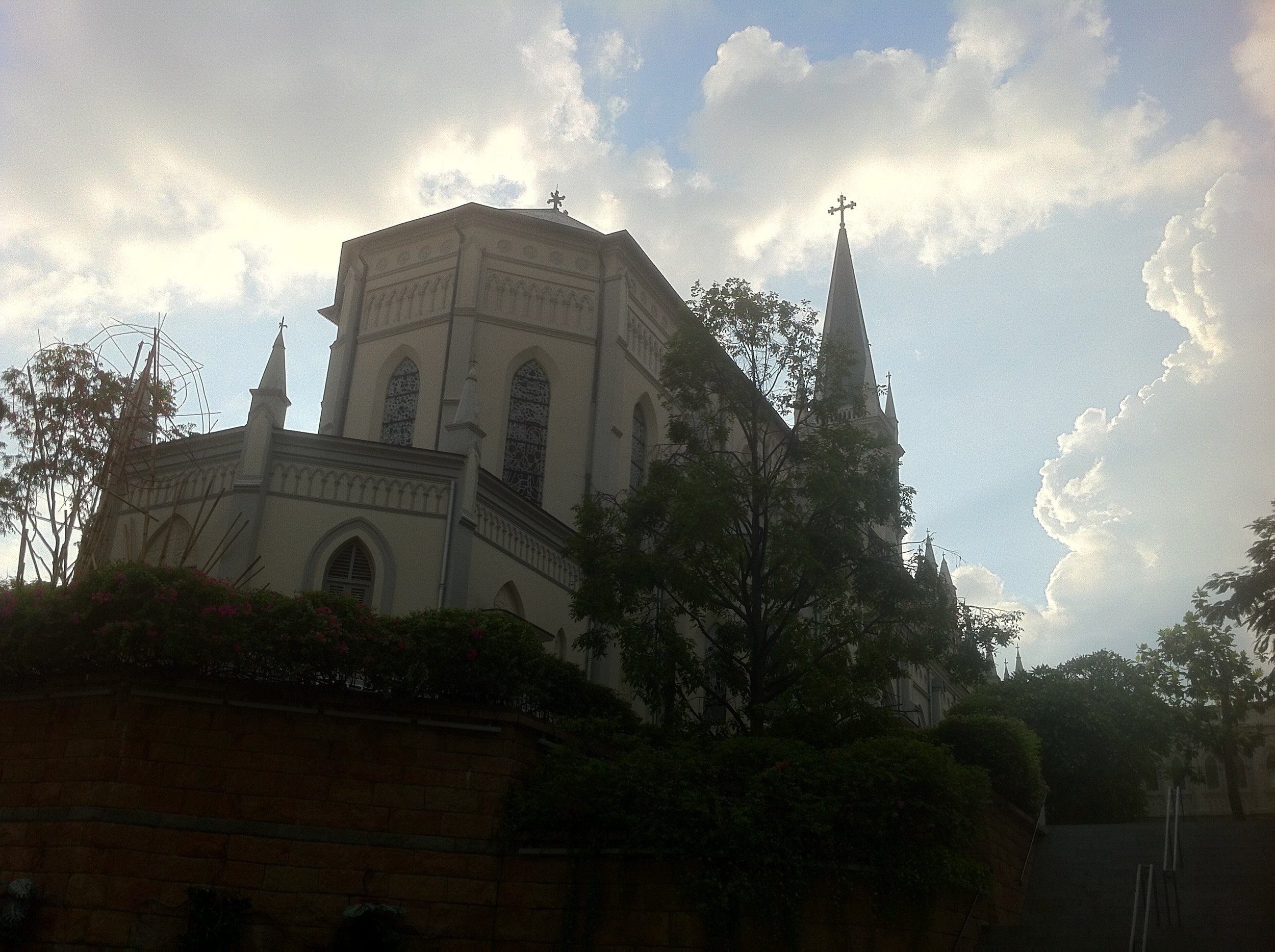
“Children without parents, or teenagers with really distant parents. They suffer under this continuous pressure to perform and to do whatever it takes to have it better at life than the previous generation. Cities like Singapore and Hong Kong are places where everything revolves around money. And if you can’t keep up, you fall into this void while the rest keeps running. That’s where the Asian churches come in and reach out in a much more spiritual way than the European churches do. We make our message a lot more about love and acceptance and choose very personal approaches.”
What makes the Asian megachurches appealing to younger generations as well is the focus on living a good life materially as well as spiritually. You won’t hear cries for modesty from their pulpits.
“God wants you to enjoy the better things in live,” says City Harvest member George Kuruvilla. “The culture in Asian cities is very materialistic. People here use the latest iPhones, wear hip clothing and drive nice cars. If you want to be relevant as a christian in a society like that, you have to go along with this. I cannot represent God while being dressed in old, worn clothes.”
Celest Foo agrees. “You have to take good care of yourself and be sure to look nice. A t-shirt could just cut it, as long as it fits. But be sure to smell nice. If I’d be wearing a lousy outfit and have a smelly breath, who would want to listen to me talking about God?”
The megachurches also strongly encourage their believers to give generously to the church. Ten percent of a salary is the norm. Prosperity in life is the reward, so the church promises.
City Harvest wraps this message in the line: “Outside, Louis Vuitton is begging for your cash. But why not give it to God? That’s real worship!”
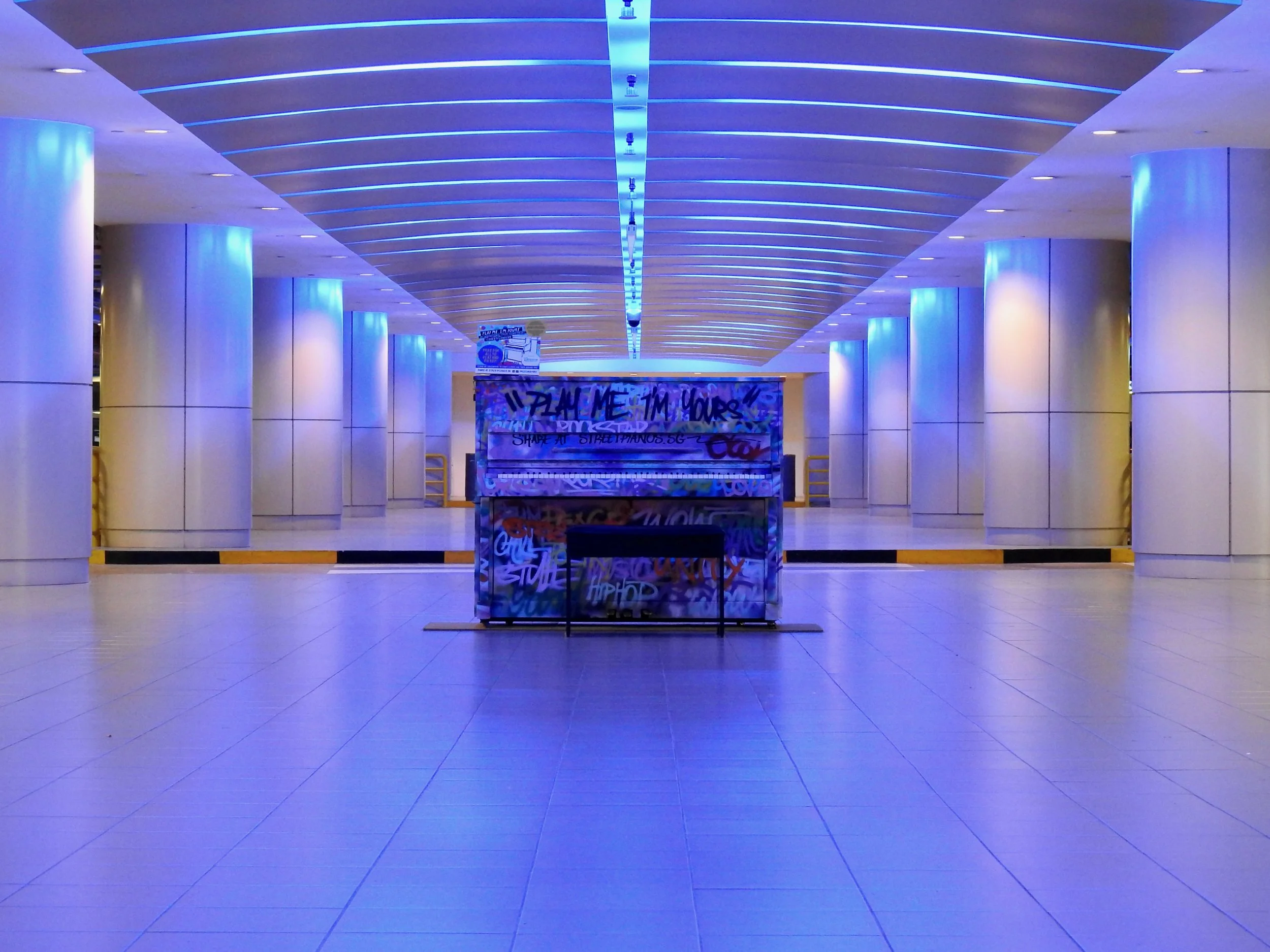
The church collected over 17 million euros in donations in 2009, the last year for which public records are available. In 2012, the church spent 58 million euros for a 39 percent share of ownership in one of Singapore’s largest shopping and conference centers. Another Singaporean megachurch, New Creation, says its 30 thousand members donated 45 million euros to the church in 2012.
City Harvest has gotten itself involved in legal troubles, since allegations were made that the church could not justify the spending of 30 million euros.
When she first joined City Harvest, Celest Foo was afraid the church would tell her to stop competing in beauty pageants. “It didn’t seem very christian to me to do catwalks in bikinis,” she says. “But just around this same time, the Miss Singapore pageant was getting close.”
Much to her surprise, Pastor Kong told her to participate. “Why not?” he says now. “What could possibly be unholy about a beauty pageant? A wet t-shirt contest goes too far, but this… There’s even a model featured in the Bible: Esther. I think having a contestant in a pageant provides the church with yet another channel to reach people with the gospel.”
Using that same motivation, Kong used the church to launch his wife’s international career as a pop star. “Pop music is a fantastic instrument to reach new generations with.”
For a short while, 42-year old Sun Ho had dance hits in the United States and the United Kingdom. There are glamour photos of her with Wyclef Jean at the MTV Europe Music Awards, with Whoopi Goldberg at New York Fashion Week and with Olivia Newton John at a studio in New York City.
Kong: “On weekdays, Sun is a worldly pop star. We use the attention that gets us to put on shows in the weekends that tell the message of the church.”

According to numbers provided by City Harvest, which are difficult to verify, Sun Ho has through her mega concerts converted 140 thousand young people in Asia to christianity. The number is based on the amount of ‘decision forms’ which concertgoers fill out.
These forms work a bit like when you apply for a store discount card. Each bit of data you hand over is integrated into the church’s database. Once that’s done, the church will call and mail you into eternity.
It’s early on Saturday night. During an intermezzo at the City Harvest service in Singapore, the church again collects dozens of ‘decision forms’ from teenagers and young adults. In the weeks to follow, City Harvest’s army of pastors will reach out to each and every one of them and embrace them until they’re firmly taken into the church’s fold.
Once that part of the service is over, it transitions seamlessly into an after-party. The stage is now occupied by a DJ, who whips up the crowd with: “We are going to praise the Lord like crazy!”
He pushes a button on his MacBook and the space that was the decor of a church service moments ago now resembles a hip nightclub. Large balloons come down and bounce of the crowd. Strobe lights flash.
The DJ shouts: “Yo! Jesus!” not missing a beat.
The dancing crowd replies with one massive shout: “Jesus!”

